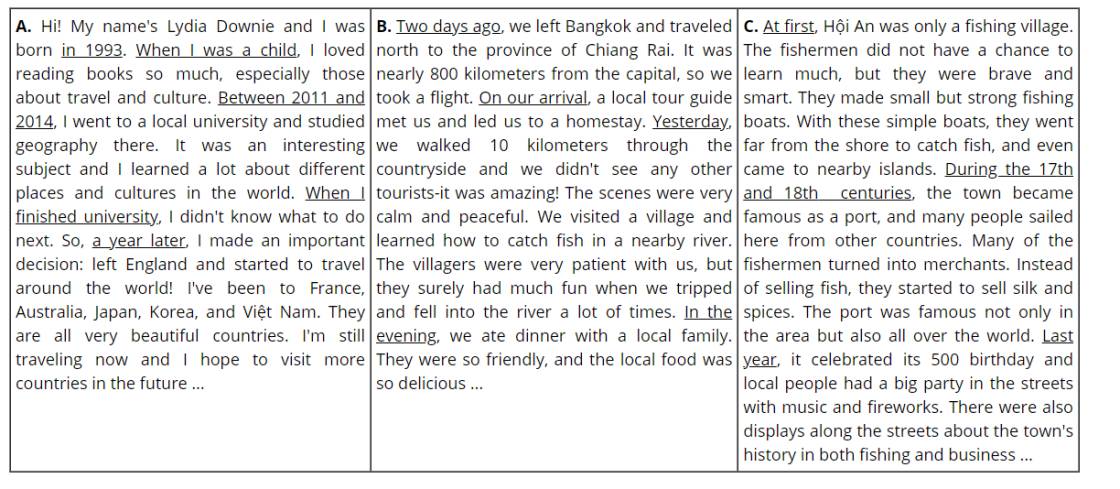Hãy nhập câu hỏi của bạn vào đây, nếu là tài khoản VIP, bạn sẽ được ưu tiên trả lời.

+ kind - shares everything with me
(tốt bụng - chia sẻ mọi thứ với tôi)
+ easygoing - never gets angry
(dễ tính - không bao giờ tức giận)
+ untidy - bedroom is a mess
(bừa bộn - phòng ngủ là một mớ hỗn độn)
+ selfish - doesn’t think about anybody else
(ích kỷ - không suy nghĩ cho bất kỳ ai khác)
+ lazy - never does any exercise
(lười biếng - không bao giờ tập thể dục)
+ intelligent - passes all tests with high scores
(thông minh - vượt qua tất cả các bài kiểm tra với điểm số cao)
Sample: (Bài hội thoại mẫu)
A: Tell me about your brother.
(Kể mình nghe về anh trai của bạn đi.)
B: My brother is unreliable because he never arrives on time. How about yours?
(Anh trai tôi không đáng tin cậy vì anh ấy không bao giờ đến đúng giờ. Anh trai của bạn thì sao?)
A: My brother does my chores with me, so he is helpful.
(Anh trai tôi làm việc nhà với tôi, vì vậy anh ấy rất hay giúp đỡ.)

Yên Vân Eco Park is a new five-star resort on the Vietnamese island of Phú Quốc, a large island with an area of 544 square kilometers. We make all our private bungalows from bamboo and each comes with its own saltwater swimming pool. All rooms have a king-sized double bed, silk mosquito nets, and a view of the beach. We have three restaurants ready to serve you delicious Vietnamese food made from fresh local ingredients. Each morning you can enjoy our buffet breakfast or have your food on your bungalow's terrace while listening to the birdsong in the nearby forest. When not relaxing in our spa, why not take a walk along our private beach? We also have daily boat trips around the island for our guests. You can try spear fishing in the sea if you would like to catch your own dinner. Children will love the water slide. It's eight hundred meters long and runs down the side of a hill. There is something for everyone at our resort. Why don't you book your next vacation with us today?

I would talk to one of the company’s representatives and ask for repairing or replacement.
(Tôi sẽ nói chuyện với một trong những đại diện của công ty và yêu cầu sửa chữa hoặc thay thế.)

Last year. I spent my summer holidays in a seaside town. The hotel was modern and comfortable. I had a wonderful holiday until the fire.
It was Saturday evening and everybody was in the discotheque on the ground floor, It was crowed with people. They were dancing and singing happily. Suddenly, we felt smoke. The black smoke began to fill up the room. Everybody began to scream in panic. People ran towards the fire exits. One door was blocké. Many people began to cough and choke.
Then, just as we all Ihoughl we had only minutes to live, the fire brigade arrived. Firemen fought their Way into the room, and soon, everyone was safely out of the building. Luckily, nobody was seriously hurt. It was the most frightening experience of my life.

1. Hilary said that she didn’t like the taste of coffee, so she couldn’t drink a lot.
(Hilary nói rằng cô ấy không thích mùi vị của cà phê, vì vậy cô ấy không thể uống nhiều.)
2. Kevin first saw baby turtle at a turtle sanctuary.
(Lần đầu tiên Kevin nhìn thấy rùa con tại khu bảo tồn rùa.)
3. Kevin saw loads of multicolored fish but he didn’t catch them.
(Kevin nhìn thấy vô số cá nhiều màu nhưng anh không bắt.)
4. Terry lost in the jungle because he chased a monkey which ran away with his sunglasses.
(Terry đã bị lạc trong rừng vì anh ta đuổi theo một con khỉ, nó đã bỏ chạy cùng chiếc kính râm của anh ta.)

She told me that her right ankle was hurting ...; She said she hadn’t twisted it... she couldn’t put any weight on it; ... I had watched a really good video clip ... the day before; I told her she must watch it; she said she had come across ...; She said that after she’d finished watching it, she had thought about sending me the link.
- Changes to pronouns (Thay đổi đại từ): I → she
- Changes to possessive (Thay đổi tính từ sở hữu) : my → her,
- Changes to references to time (Thay đổi tham chiếu thời gian): yesterday → the day before